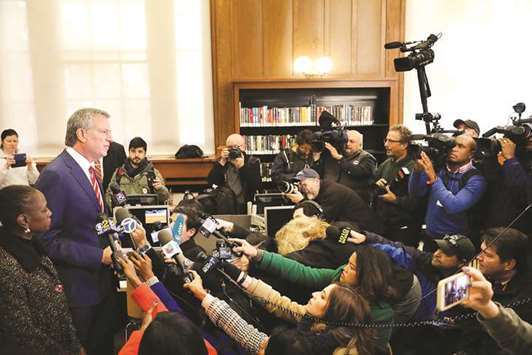New Yorkers went to the ballot box yesterday in local polls widely tipped to be won by Mayor Bill de Blasio in a city pumped by loathing for home-town boy Donald Trump.
The 56-year-old former city councillor from Brooklyn may excite few and may be sniffed at by Wall Street, but his progressive Democrat credentials and an absence of serious challengers is expected to propel him back into office for another four years.
Even with a low turnout, that will be no mean feat in the financial capital of the world’s biggest economy, where the left-leaning politician presides over an annual budget of $85bn, a city payroll of 295,000 and 8.5mn New Yorkers.
“He ain’t the greatest but we have to have a Democrat,” said Peter Schnieder, 71, while casting his ballot in de Blasio’s home district of Park Slope, an uber wealthy, progressive enclave of Brooklyn. “He’s not too bad. He’s good enough to vote for.”
The mayor won plaudits for achieving his signature campaign promise: universal pre-kindergarten education for four-year-olds, and already rolling out a phased induction of three-year-olds.
Crime is also down, capitalising on the long-term trend under his Republican-turned-independent billionaire mayor predecessor Mike Bloomberg, and business is good.
His Republican challenger, 36-year-old Nicole Malliotakis, has been left trailing in the dust.
So has libertarian candidate Bo Dietl.
De Blasio has fended off federal and state investigations into fundraising – no charges have been brought.
An early confrontation with police – having warned his bi-racial son to take “care” with officers, has long since dropped off the headlines.
So how has the mayor – who physically towers over everyone else at 6’ 5” (1.96m), is criticised for schlepping out to his Brooklyn gym and of lacking Bloomberg’s charisma – pulled off such a home run?
In an overwhelmingly Democratic city where 80% of the electorate voted for Hillary Clinton and Trump is despised, de Blasio has emerged as a symbol of opposition to the White House defending the rights of all.
“My hope is, staring today, if the people are with me, then we restore the idea this is a consistent Democratic and progressive town, and that goes on for many years to come,” de Blasio declared yesterday.
“Anybody who opposes Trump is OK with me!” agreed 69-year-old retiree Geraldine on Manhattan’s Upper East Side, declining to give her last name.
But unlike the cosy relationship between Bloomberg and Wall Street in a city with more billionaires than any other in the world, De Blasio’s politics are too centre-left for comfort when it comes to the wealthiest powerbrokers.
“Somehow he has not been able to convince the city business elite that he has their interests at heart,” said Columbia University history professor Kenneth Jackson.
In a city where even dogs wear cashmere in winter, he has come under fire over the rising homeless population and for his proposed millionaire tax, with which he proposes to overhaul the increasingly crisis-ridden subway.
Scott and Jennifer Goodwin, a financial services worker and a stay-at-home mum, who are both registered Democrats said they voted Malliotakis in protest.
“It makes me sad I had to go against a Democrat,” Jennifer told AFP. “I am seeing things I didn’t see five years ago, the homeless are everywhere.”
But in a city where whites – de Blasio’s most vocal opponents – make up only 33% of the electorate, and 38% of New Yorkers are foreign-born, he is bolstered by strong support among Latinos and African Americans.
His wife, Chirlane McCray, is African American.
Besides the mayoral election, two gubernatorial elections are also taking place yesterday, in what could be bellwethers of sentiment a year after Trump’s election and a year before the 2018 mid-terms.
In New Jersey, Democratic frontrunner Phil Murphy is expected to replace outgoing Republican and Trump ally Chris Christie.
In Virginia, Republican Ed Gillespie and Democratic Lieutenant Governor Ralph Northam are neck and neck.

De Blasio stands with his wife Chirlane McCray while speaking to the media after voting at a public library in Brooklyn yesterday.
